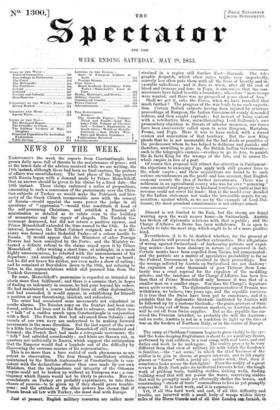NEWS OF THE WEEK.
Tnaouorteux the week the reports from Constantinople have grown daily more full of threats to the maintenance of peace ; and
at the latest date of the advices received while we are writing, the 19th instant, although there had been no final rupture, the posture of affairs was unsatisfactory. The last phase of the long quarrel with Russia began with a demand made by Prince Menschikoff, that an answer should begiven to his claims by a fixed date—the 10th instant. Those claims embraced a series of propositions, amounting to such a concession of the protectorate over the Chris- tian subjects of Turkey as would make the Patriarch and hier- archy of the Greek Church irremoveable save with the consent of Russia—would appoint the same power the judge in all
questions of " oppression "—would thus constitute it head of the self-governing Christians, and establish a Russian ad-
ministration so detailed as to relate even to the building of monasteries and the repair of chapels. The Turkish Go- vernment demurred, but did not return a positive answer, and Prince Menschikoff extended the time named to the 13th. In the interval, however, the Rifaat Cabinet resigned, and a new Mi- nistry was formed under Redsehid Pasha—of a colour hostile to Russia. It would appear that the Ministers of other Foreign Powers had been consulted by the Porte ; and the Ministry re- turned a definite refusal to the claims urged upon it by Prince Menschikoff. After waiting a short time, at midnight, in a mode highly unceremonious, he retorted with the announcement of his 1 departure : "and accordingly, sternly resolute, he went on board ; but he did not heave his anchor, nor even make a show of sailing ; and he remained at Thiyukclere down to the 19th, not refusing to listen to the_ _representations which still pursued him from the Turkish Government.
By some, Meischikoff's pantomime is regarded as intended for alarm more than fulfilment; and there is a surmise that, in hopes of finding an indemnity in success, he had gone beyond his orders. He had maintained a course isolated from all other diplomatists, and had succeeded, it would appear, in establishing for himself a position at once threatening, insolent, and ridiculous.
The crisis had. occasioned some movements not calculated to soothe alarms. The Russian army, on the frontier had been rein-
forced, orders had been sent to the fleet to advance, and there was a " talk" of a sudden march' upon Constantinople in conjunction with a fleet. The French fleet had advanced frord Salamis and
vessels of our own navy are_ understood to be making, fOrwerd movements in the same direction. But the last aspect of the news is a little less,threatening : Prince Menschikoff still remained and listened; the French fleet had made a retrograde movement; the " talk" had subsided considerably; and hints are thrown out, in quarters not unfriendly to Russia, which suggest the anticipation that the Emperor would find a loophole out of the difficulty by disavowing the'extreme courses of his representative.
This is no more than a bare recital of such phrenomena as are patent to observation. The firm though conciliatory attitude
maintained the British Ambassador at Constantinople is con- sistent with the declarations oftener than once made by our own Ministers, that the independence and integrity of the Ottoman empire could not be broken up without an European war ; a con- tingency which Russia would not be likely to provoke. Her en- croachments on Turkey are probably experiments, to take their chance of success—to be given up if they should prove trouble- some: and the attitude of the other powers has shown that if Russia break all law with Turkey, she must deal with Europe.


































